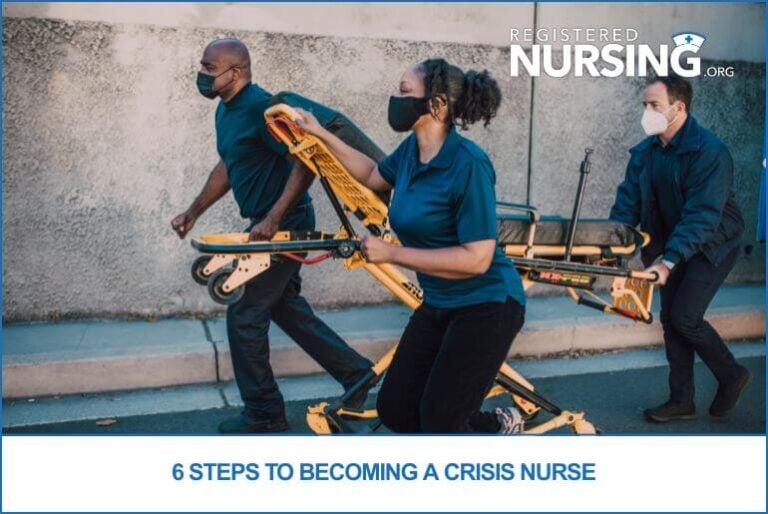6 Steps to Becoming a Crisis Nurse
- What Is a Crisis Nurse?
- Step 1: Earn Your Registered Nurse (RN) License
- Step 2: Gain Clinical Experience in High-Stakes Settings
- Step 3: Pursue Certifications Relevant to Crisis Nursing
- Step 4: Develop Emotional Resilience and Soft Skills
- Step 5: Apply to Crisis Nursing Agencies or Disaster Response Teams
- Step 6: Keep Growing with Continuing Education and Specialization
- Start Your Career as a Crisis Nurse
- Sources
- Latest Articles & Guides

Crisis nurses are among the first to respond when disaster strikes—whether it's a natural catastrophe, a mass casualty event, or a public health emergency. These highly skilled professionals provide critical care during moments of extreme need, delivering stability and compassion when patients and communities are most vulnerable.
In a world increasingly affected by climate events, pandemics, and geopolitical unrest, crisis nursing is more essential than ever. According to the U.S. Department of Health and Human Services, the demand for rapid-deployment healthcare professionals, including crisis nurses, has grown significantly in the past decade. In fact, organizations like the National Disaster Medical System (NDMS) have expanded their networks of emergency medical responders, including crisis-trained nurses, to support federal and state disaster responses across the U.S. and internationally.
For nurses seeking a role that combines resilience, mobility, and purpose, crisis and emergency nursing offers an unmatched opportunity to make a difference. These nurses work at the intersection of public health, humanitarian service, and emergency care—making it one of the most impactful and versatile specialties in nursing today.
This step-by-step guide outlines the six essential steps to launching a career as a crisis nurse. You'll learn what education, training, and mindset are required—and how to build a career in one of the most meaningful and fast-paced fields in nursing.
What Is a Crisis Nurse?
Crisis nurses are trained to respond to emergencies where healthcare infrastructure is strained or overwhelmed. They often work on short-term assignments, both domestically and internationally, providing critical care in hospitals, shelters, field clinics, or disaster zones.
Common responsibilities include:
- Stabilizing patients in emergency or trauma settings
- Responding to mass casualty incidents or disease outbreaks
- Managing triage in resource-limited environments
- Collaborating with FEMA, Red Cross, and emergency response teams
- Offering psychological first aid and trauma-informed care
- Administering vaccines or medications during epidemics
- Setting up mobile health units or field hospitals
Crisis nurses must be adaptable, calm under pressure, and capable of practicing across diverse clinical and geographic settings. Their work is not only vital for individual patients but often helps restore public health systems and prevent further spread of disease or injury.
Step 1: Earn Your Registered Nurse (RN) License
All crisis nurses start by becoming a licensed registered nurse. This foundational step ensures you have the core competencies in patient care, assessment, and clinical decision-making required to perform under pressure.
Choose the Right Nursing Program
You can pursue an Associate Degree in Nursing (ADN) or a Bachelor of Science in Nursing (BSN). While both paths lead to RN licensure, a BSN is increasingly preferred, especially for roles in emergency, trauma, or public health nursing. A BSN also opens doors to leadership, travel assignments, and specialized training programs.
| Degree | Duration | Focus | Tuition Range |
| ADN | 18–24 months | Basic nursing skills, clinical practice | $6,000–$20,000 |
| BSN | 3–4 years | Advanced theory, leadership, public health | $20,000–$100,000 |
After completing your program, you must pass the NCLEX-RN exam to obtain licensure. This national examination tests your ability to provide safe, effective care and is required for all practicing RNs.
Step 2: Gain Clinical Experience in High-Stakes Settings
Crisis nursing requires more than general nursing knowledge—it demands hands-on experience in fast-paced environments where patient acuity is high and time is limited. Most employers seek candidates with 1–2 years of clinical experience, particularly in:
- Emergency departments
- Intensive care units (ICU)
- Trauma centers
- Medical-surgical units
- Burn units or infectious disease wards
These high-pressure environments prepare you to respond quickly, prioritize care, manage complex conditions, and work collaboratively within multidisciplinary teams. Many nurses who become crisis responders describe this clinical experience as critical to developing the grit and decision-making skills needed for disaster settings.
You can learn more about these entry points in the RN Specialty Guide.
Step 3: Pursue Certifications Relevant to Crisis Nursing
Earning certifications strengthens your credibility and prepares you for the rigors of crisis conditions. These certifications are often required by response agencies and help ensure you are up to date on life-saving procedures.
| Certification | Issuing Body | Focus Area |
| TNCC (Trauma Nursing Core Course) | ENA | Trauma care and triage |
| PALS (Pediatric Advanced Life Support) | AHA | Emergency care for children |
| ACLS (Advanced Cardiovascular Life Support) | AHA | Cardiac and respiratory emergencies |
| BLS (Basic Life Support) | AHA | Foundational life support skills |
| CEN (Certified Emergency Nurse) | BCEN | Expertise in emergency nursing |
| NRP (Neonatal Resuscitation Program) | AAP | Infant resuscitation in emergencies |
In addition to bolstering your skills, these credentials may increase your earning potential and eligibility for travel assignments with higher pay and additional benefits. Explore options in the Nursing Certifications Directory.
Step 4: Develop Emotional Resilience and Soft Skills
In addition to clinical expertise, crisis nurses must possess strong emotional intelligence, adaptability, and psychological resilience. These roles often place you in high-stress, emotionally charged environments, where patients and families are frightened, displaced, or grieving.
Key Traits for Crisis Nurses:
- Emotional stability and composure during emergencies
- Rapid critical thinking in unfamiliar or changing environments
- Strong communication, especially with culturally diverse populations
- Teamwork in high-stakes interagency environments
- Flexibility and resourcefulness in low-resource settings
Many crisis nurses participate in workshops or continuing education focused on mental health first aid, trauma-informed care, and debriefing strategies. Being mentally prepared and supported is just as important as being clinically competent.
Joining professional organizations such as the Emergency Nurses Association (ENA) or National Association of School Nurses (NASN) can offer continuing education, professional development, and peer support.
Step 5: Apply to Crisis Nursing Agencies or Disaster Response Teams
Once you've built your clinical foundation and earned relevant certifications, you can begin applying to crisis response organizations. These may include local, national, or global agencies, depending on your interests and availability.
Agencies to Explore:
- U.S. Department of Health and Human Services (HHS)
- American Red Cross – Disaster Health Services
- International Medical Corps
- Doctors Without Borders
- Samaritan's Purse – Disaster Assistance Response Team
Assignments can last from a few weeks to several months and may involve domestic natural disaster response, international humanitarian missions, or support during health system surges. Crisis nurses often receive compensation packages that include hazard pay, per diem allowances, and travel expenses.
Some nurses start with volunteer deployments to gain experience before transitioning into paid assignments. Be sure to thoroughly research each organization's training and credentialing requirements.
Step 6: Keep Growing with Continuing Education and Specialization
Crisis nursing is constantly evolving due to changes in global health threats, emerging diseases, and natural disaster patterns. To remain effective and competitive in the field, ongoing learning is essential.
Recommended continuing education and career growth opportunities include:
- Advanced trauma care courses (ATCN, ATLS)
- Public health certifications (e.g., CPH)
- Humanitarian response and global health workshops
- Master's programs in emergency or public health nursing
- Training in epidemiology, logistics, or cross-cultural care
Some crisis nurses pursue leadership roles as deployment coordinators or educators, mentoring new nurses entering the field. Others choose to blend crisis response with specialties like flight nursing or infectious disease control.
Start Your Career as a Crisis Nurse
Crisis nursing isn't just a career—it's a calling. If you’re driven by purpose, flexibility, and the ability to provide urgent care where it’s needed most, this specialty may be your next step. From local emergencies to global humanitarian missions, crisis nurses serve on the front lines of health and hope, bringing critical care and comfort to those in crisis.
Take the first step by researching accredited nursing programs, preparing for certifications, and exploring opportunities with respected crisis response organizations. Your future as a crisis nurse starts now—be ready to respond when the world needs you most.
Sources
- U.S. Department of Health and Human Services (HHS)
- National Council of State Boards of Nursing – NCLEX
- Emergency Nurses Association (ENA)
- American Heart Association (AHA)
- American Red Cross
- Doctors Without Borders
- International Medical Corps
- Samaritan's Purse
Latest Articles & Guides
One of the keys to success as a registered nurse is embracing lifelong learning. Our articles and guides address hot topics and current events in nursing, from education to career mobility and beyond. No matter where you are on your nursing journey, there’s an article to help you build your knowledge base.
Browse our latest articles, curated specifically for modern nurses.



